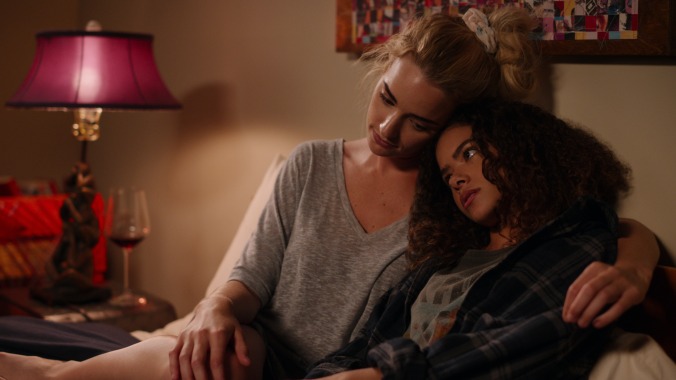Ginny & Georgia needs to step out of Gilmore Girls’ shadow


A few years ago, Saturday Night Live ran a pre-taped sketch poking fun at how much content Netflix was spewing, more than anyone could ever watch even if they had multiple lifetimes. The fake ad explained that Netflix was accomplishing this by buying “everything,” with Heidi Gardner suggesting in a pitch meeting a show “about a girl named Ginny.” Mikey Day’s executive starts throwing money at her: “Yes! Here, go! Make it!”
This is not to suggest that this was the extent of the Ginny & Georgia pitch meeting, because the new Netflix series has a lot in common with a previous, much-beloved show, so there had to be some Gilmore Girls references in there. Perhaps “It’s like Gilmore Girls… but with an edge!” Or, “What if Lorelai Gilmore came from the poor, rural South instead of upper-class Connecticut?” Ginny & Georgia blurs the line between homage and cookie-cutter replica. The leads are a former teen-mom and her teenage daughter who live in a close-knit New England town, where both are torn between two suitors. There’s a perfectly nice boyfriend and a bad boy lurking around for the daughter, while the mom pairs up with a clean-cut white-bread guy, but has much more chemistry with the proprietor of a local restaurant.
Helmed by an all-female creative team, including first-time creator/executive producer Sarah Lampert, first-time showrunner/executive producer Debra J. Fisher, and director/GLOW alum Anya Adams, Ginny & Georgia is like a fun-house mirror version of Gilmore Girls. And just in case you missed the plethora of other references, Georgia (Brianne Howey) cheerfully declares in the first episode, “We’re like the Gilmore Girls with bigger boobs!” The pilot also contains Gilmore Girls touchstones of pop culture references and junk food.
There are some differences, of course: The small family has just arrived in Wellsbury, Massachusetts, after the death of Georgia’s husband in Texas. Ginny (Antonia Gentry) has a younger brother, Austin (Diesel La Torraca), who wears lensless glasses and is obsessed with Harry Potter. Georgia sports a Barbie-inspired wardrobe and a twangy accent that sounds like she’s seen way too many Designing Women episodes. On the upside, Ginny & Georgia is much more inclusive than the WASPy Stars Hollow, though sometimes those efforts miss the mark. Georgia’s new co-worker (the Michel stand-in) makes an unsubtle Grey Gardens Freudian slip to underline his queerness. G&G appears to make a concerted effort to depict realistic teenagers, the kind who smoke pot and raid their parents’ liquor cabinets. The sex scenes are a bit graphic, continuing the unsettling Netflix trend of showing underage sex lives (Outer Banks, Tiny Pretty Things), even though they’re fortunately performed by twentysomething actors. Obtuse voice-overs by both of the leads don’t add much insight. (Georgia: “For women, life is a battle. And beauty is a goddamn machine gun.”)
G&G seems committed to realistically tackling the teen issues of the day, but unfurls so many—race, body image, self-harm, sex, bullying, divorce, sexting, the aforementioned drinking and drugs—and then doesn’t appear to know what to do with them all. Ginny’s dad is Black, and her laments over feeling like she doesn’t really fit in with the white kids or the Black kids are some of the series’ most effective moments. But not all the raised issues receive such careful treatment: Early on, Ginny’s new friends set her up to get her in trouble, an event that’s never really reckoned with, and after which they somehow remain friends. One scene of Ginny’s classmate Abby (Katie Douglas) duct-taping her thighs is heartbreaking, but it’s never followed up on; same with the few times Ginny pulls out a lighter with the intent of hurting herself. Ginny’s best friend, Maxine (Sara Waisglass), has a crush on an older girl at school; yet Maxine’s incessant motor-mouthed Lorelai-like patter (her own mother desperately tries to wrest her away from caffeine) jeopardizes any affection we may feel for the character.
You could say that about a lot of Ginny & Georgia. Everyone seems to be trying hard, the show is visually cozy, and some of the actors—especially Antonia Gentry as Ginny and Schitt’s Creek’s Jennifer Robertson as Maxine’s mom and Georgia’s new friend—are particularly appealing, but there’s just no there there. Pointed flashbacks revisit Georgia’s rough roots and reveal how she escaped from Alabama to arrive where she is today, to help explain why she has a gun in her closet and why she’s a bit greedy with the petty cash at work. Her boss, Paul (Scott Porter), is mayor of the town (basically, a Christopher/Taylor hybrid), and determined to make governor by the age of 40 for no logical reason that anyone can fathom. Ginny and Georgia have a fairly contentious relationship that is much more typical for life with an adolescent than Gilmore Girls (Lorelai and Rory would never have an “I hate you!” “I hate you more!” fight). Georgia believes that she has to hide a lot of her troubled past to keep her kids safe; but as Ginny gets older and realizes how much her mom has been lying to her, her resentment is set aflame.
Fifteen-year-olds are known for their self-absorption, after all. Ginny definitely has her moments, and Gentry rises to the occasion: rolling her eyes at the fun pedicure/karaoke party her mom planned for her birthday; trying to have a serious conversation with Maxine when she’s literally right in the middle of a school performance. Her immediate chemistry with Maxine’s brooding twin brother, Marcus (Felix Mallard, the Jess), both intrigues and terrifies her, while Georgia’s connection with Joe (Raymond Ablack, the Luke) is the kind that could happily smolder for at least a few seasons.
Still, Ginny & Georgia’s finest moments arise when the show focuses on real conversations. Maxine and Marcus’ dad is deaf, and the family’s dialogue/sign language hybrid way of communicating is refreshing to witness. Ginny and her friends go to a school event where the stylist at the ponytail stand doesn’t know how to work with her hair, because she’s one of the only Black kids in the entire town. Ginny and her boyfriend, Hunter (the Dean), get in a fight after he beats her in an essay contest at school. She cries racism; he points out that because he’s half-Taiwanese, his life isn’t exactly a picnic either, and protests getting into a bout of “oppression Olympics.”
Ginny & Georgia would do well to pare down its multitude of issues and subplots to focus more on valuable moments like these. As it stands, it’s completely muddied up with ominous threads from Georgia’s past and ends on the most improbable cliffhanger imaginable. There’s a decent YA show in here somewhere, but along with its abundance of plot, Ginny & Georgia needs to step away from the plethora of Gilmore Girls references to get there.